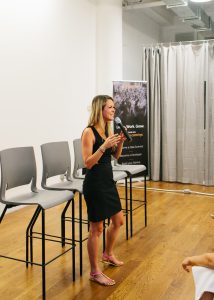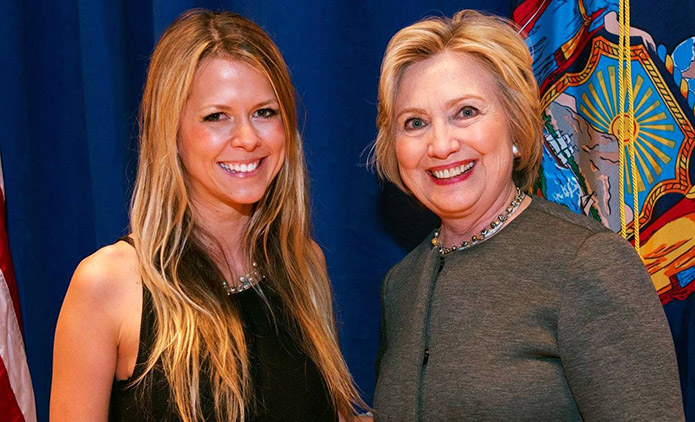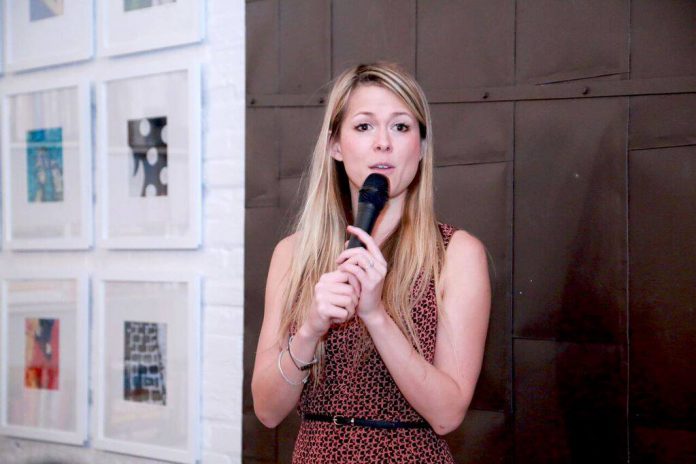I meet Gesche Haas in the crowded media lounge at the Web Summit, where she had appeared on-stage the day before to speak about her start-up venture. Of all the successful women at Web Summit – of which there were many – Haas was the one I had really wanted to interview. I had followed the progress of her company Dreamers // Doers, for a while – and on the day that saw Trump elected to the White House, when better to interview a woman who was named the 2016 Empowered Women of the Year?
After spending five years in finance, Haas entered the start-up world in a business development role for popular group-dating startup Grouper. From there, she saw the need for a support network for female entrepreneurs, and Dreamers//Doers, the first project from her start-up studio Trailblazer Ventures, was born.
Haas is a bundle of energy. Immediately warm and welcoming, she spots a cushion on the floor, curls up on it and begins speaking like someone who is always on the go: at a thousand words a minute, and barely stopping for breath.
“Our mission is to increase the number of successful ventures launched by women. It is really hard to start something, and your chances of success are higher if you have a network. It is more efficient and effective for women to leverage each other as a resource“, she said of Dreamers // Doers.
Having been on the website myself, I noted the use of a selection process for women wanting to join. When I broach this topic, she anticipates my question and smiles:
“Selection doesn’t equal exclusivity”,” she says, despite my raised eyebrows. “It depends what you’re looking for.”
“We look for personality, rather than pedigree. We want trailblazing women – anyone who has really big aspirations but, essentially, believes you can do more by achieving it together.”

Playing the devil’s advocate, I asked whether some might think that having a female-only group is sexist. Imagine the outrage there would be if it was a male-only networking club, designed to advance only opportunities for men. I wonder what exactly is it that makes Dreamers//Doers different.
Haas is quick to make it clear that Dreamers//Doers doesn’t entirely exclude men. “Online it’s women only, but offline men are highly, highly welcome.”
The problem, she continues, is the preconception that women aren’t as capable as men. Untrue though it undoubtedly is, being surrounded by men in the tech industry can make women feel in the minority, with proven negative effects.
“There is already a gap between men and women, and a lack of confidence. If you are the only women in your industry doing what you’re doing – you can join Dreamers and Doers and you don’t feel like you’re in the minority anymore.”
“If we want things to change, we have to do things differently”, she finishes firmly.
Tentatively, I move on to my next topic. I had been unsure as to whether to bring up the ‘the incident’, as she calls it, because Haas should be – and is – known for so much more than a sexist altercation with a man. But with sexism remaining such a prevalent issue for women in business, increasing awareness can be one of the only ways to tackle it.
Haas had been at a tech conference in Germany, during which she had a brief conversation with European Angel investor, Pavel Curda. After swapping business cards, she later returned to her hotel room to find an email from him with the subject: I like you a lot. The message read, “Hey G. I will not leave Berlin without having sex with you. Deal?”
Haas was sure the meeting had been nothing more than business, but the email made her question herself and her behaviour. Had she inadvertently encouraged him? It took her a month to speak out, first anonymously and then in a public blogpost.
She says, “Had it happened now, I would just call the person out on the spot. But at that point, I was so startled. I’m glad it went the way it did, and to have the process unravel naturally.”
Dealing with sexual harassment can be a defining moment for women, I say, and fortunately Haas agrees: “Women can get attacked for speaking out, and have people say they are doing it for attention. But it happened, and now I’m a different person for it.”
“The only way to change [sexist views] is for more women to be extremely successful, in whatever field or passion they choose. We need more women in positions of power who are good at what they do; we need more women and men to believe in women.”

Adopted by several nations to tackle the gender gap in business, I ask her thoughts on boardroom quotas. She thinks for a moment, before launching in.
“People who are negative towards quotas must believe that there are not enough qualified women to justify them. That companies are putting women into top roles that they aren’t qualified for, just to fill a quota. But that’s already biased, isn’t it? The belief that there are not enough women who are qualified enough to fill the roles.”
As she was speaking, something clicked in my brain. I’d never thought about it like that, I say, and she laughs: “Neither had I. I just figured it out whilst I was talking.”
That’s the thing about her Haas; her strong sense of belief in what she does is obvious, and her enthusiasm is infectious. As she speaks, I can’t help but think that this is the sort of role model young girls need. Women are unrepresented in fields like tech, given the overall male dominance of science-based industries. So what would she say to any young girls who feel that tech is just for boys?
“Tech is just so frickin’ fun!”, she answers, beaming at me as she says it. It’s clearly her passion.
“You can build things, you can make things, you can do anything. Yes, people assume that it’s full of guys – but it’s fun being different and not doing the things everyone else is doing.
“You only have one life and there’s so much beauty in being challenged and standing out, so many advantages of being a woman. If you let your gender stop you, you are limiting your potential and limiting what you can achieve.”
As the interview draws to a close, I reflect on the potency of the day’s presidential election results. If Hillary Clinton still can’t break the glass ceiling, what hope is there for the rest of us?
“Our strengths are only strengths if we let them be; our weaknesses are only weaknesses if we let them be,” Haas told me. She’s right – and with women like Haas inspiring and supporting female entrepreneurs, women in tech can only go from strength to strength.

